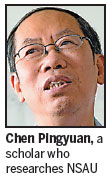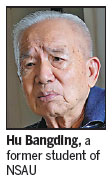|
The gate of NSAU in an undated photo. Photo Provided by China Features |
Despite the hardships, NSAU was perhaps the best school at the time.
"NSAU laid the foundation for every achievement I made," said physicist C.N. Yang, a 1957 Nobel Prize winner.
He still remembers teaching in a temporary classroom in Yunnan that had no glass for the windows. "On windy days, we had to hold down the paper on the desk, which would otherwise blow away," he said.
The steel roof of classrooms became noisy on rainy days, sometimes too noisy for students to hear the teacher. One day, a professor had to suspend his class, writing "let's enjoy the rain" on the blackboard.
Air raids provided constant interruptions.
"During the worst of it, students had class before 10 am and after 4 pm, to avoid air attacks," Hu Bangding recalled.
He remembered several anecdotes about NSAU's professors.

"At that time, we barely had enough food," Hu said. Students would rush to the canteen to compete for their fair share. "Professor Chen Daisun had two watches, with which he assured us that we would be dismissed on time." Chen became a renowned economist.
"History professor Wu Han could always find connections between historical events and the latest news," Hu said.
The professors had one thing in common: They were strict.
During eight years, nearly 8,000 students passed the entrance exam to enroll in NSAU, but only 3,800 graduated.
In 1945, when Japan surrendered, everyone in the university was ecstatic.
Mathematician Hua Luogeng was found lying drunk on his doorstep holding a roast chicken. Chinese literature professor Wen Yiduo, who had grown his beard for eight years, shaved his face.
The legacy

The universities moved back to Beijing in 1946.
A monument at Yunnan Normal University commemorates NSAU. On one side is an inscription by philosopher Feng Youlan, and on the other are the names of 800 soldiers who quit the university to serve in the armed forces.
There are similar monuments at Peking University, Tsinghua University and Nankai University where people lay flowers on special occasions such as Youth Day on May 4.
Chen, the researcher, said NSAU epitomized China's education during the war. Dozens of universities have similar tales of moving campus during that period.
"During the eight years of the War of Resistance Against Japanese Aggression (1937-45), the number of high schools grew from 108 to 141, and the number of students rose from 41,992 to 83,498," he said.
"It is a miracle in the world of education history. No other country saw such large-scale migration of professors and students during World War II."